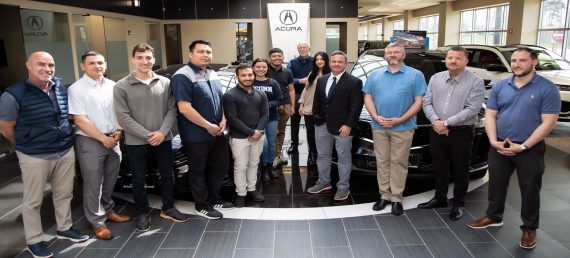Honda Research Institute Launches “Curious Minded Machine” Research Collaboration
Seeking to develop a type of artificial intelligence that enables life-long learning with a human-like sense of curiosity, Honda Research Institute USA, Inc. announced a new initiative, the Curious Minded Machine (CMM), to expand its cognitive robotics research.
During the three-year program, research teams from the Computer Science & Artificial Intelligence Laboratory (CSAIL) at Massachusetts Institute of Technology (MIT), the School of Engineering and Applied Science at the University of Pennsylvania (Penn), and the Paul G. Allen School of Computer Science & Engineering at the University of Washington will collaborate with Honda Research Institute to explore the mechanisms of curiosity. With the goal of advancing breakthroughs in artificial cognition, the outcomes of these collaborations will facilitate the synthesis of Curious Minded Machines. Visit the project website at https://CuriousMindedMachine.com.
Developing Curious Minded Machines to Expand People’s Potential
Honda Research Institute defines a Curious Minded Machine as a robot or intelligent system that learns continuously in a human-like, curiosity-driven way. By developing different models of curiosity to understand how children “learn to learn” about the world, the Curious Minded Machine research collaboration aims to create new types of machines that can acquire an interest in learning and knowledge, the ability to learn and discover, and the ability to interact with others. This type of intelligent system could extract intention from interactions instead of mimicking without understanding the purpose.
For example, just as coaches and trainers seek to optimize human performance, the Curious Minded Machine could enhance an individual’s personal and professional development. By observing human interactions and tasks, the Curious Minded Machine could identify better ways to complete tasks or help people achieve their goals.
“Our ultimate goal is to create new types of machines that can acquire an interest in learning and knowledge, and the ability to interact with the world and others,” said Soshi Iba, a principal scientist at Honda Research Institute USA, Inc. “We want to develop Curious Minded Machines that use curiosity to serve the common good by understanding people’s needs, empowering human capability, and ultimately addressing complex societal issues.”
The Curious Minded Machine initiative explores the integration of machines with humans and society, and is one of Honda’s approaches to realizing Cooperative Intelligence (CI). The CI concept is artificial intelligence embedded in a social context that enables people to build confidence and trust with artificial systems. Expanding on Honda’s 3E (Empower, Experience, Empathy) Robotics Concept, announced at CES in January 2018, the Curious Minded Machine program highlights Honda’s vision of a society where robots and people can work together while leveraging each other’s strengths; grow together by interacting with each other; and achieve a mutual empathy to support human activities.
Network of Excellence
In collaboration with Honda Research Institute, multi-disciplinary teams of researchers from MIT’s CSAIL, Penn Engineering, and the University of Washington’s Paul G. Allen School of Computer Science & Engineering will explore new approaches, methodologies, and ideas to identify promising research and results that will form the basis for more detailed investigations and demonstrations.
The focus areas for each research team are:
- MIT CSAIL: The team is addressing a key limitation in robotic action planning by focusing on establishing a causal theory of sensor percepts to predict future percepts and the effect of future actions.
- Penn Engineering: The team is focusing on today’s challenges in machine perception by learning from biological systems, and applying an embodied, active and efficient approach to acquiring representations of the surrounding world and actions.
- University of Washington Paul G. Allen School of Computer Science & Engineering: The team is addressing the challenges of enabling robots to work effectively in human environments. By taking a page from child-learning through exploration, the team aims to construct a mathematical model of curiosity.
At the conclusion of the three-year program, each team is expected to show tangible results in the form of working examples, prototypes, or demonstrations that will serve as the foundation for realizing Curious Minded Machines.

